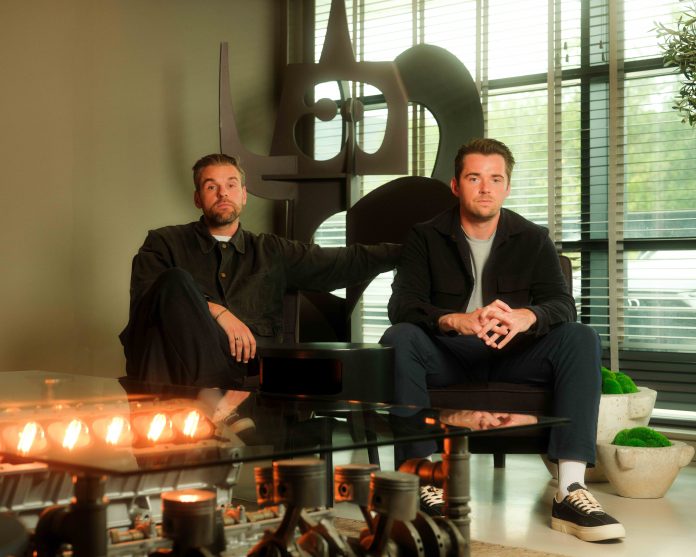Some people sell preloved clothes online as a part-time hobby. But two brothers from Ipswich have turned vintage goods into a multi-million-pound business.
Zac and Josh Hembry, pictured, founded Messina Hembry as a side hustle in 2012, buying and reselling designer pieces found in second-hand shops.
Today their business has a warehouse in the town which spans over 50,000 sq ft, houses over 500,000 items of vintage clothing and doubles as creative studios.
And the brothers – now both in their 30s – employ 100 staff to keep this vintage fashion powerhouse running.
The company sells their handpicked vintage clothes on their own website, as well as through major online retailers such as eBay and Vinted.
Each week they sell over 10,000 items and reach more than one million customers worldwide.
Zac, Messina Hembry CEO, said: “This all started really simply, just trying to earn a bit of extra money while at university.
“Josh and I would spend weekends trawling charity shops for designer pieces, buying what we thought was interesting or well-made, and then listing them online.
Hobby turned business
“At first, it was more of a hobby than a business. We just enjoyed finding cool, unique items and making a little cash along the way.
“After a while, we started noticing that people were genuinely interested in the pieces we were selling. That’s when it clicked that there was a real opportunity here.
“Vintage just felt like the right space. It was a market with low barriers to entry, but more importantly, it gave us the chance to tackle the environmental impact of the fashion industry, which is something we were really passionate about.”
Messina Hembry – named after the brothers’ family tree – specialises in quality second-hand clothes that are well-made, timeless, and hold their value.
Each item must meet strict criteria, covering brand, product type, construction quality, and material, before earning a place in the collection.
“And being in our thirties has helped us bring a fresh perspective to vintage retail,” Zac added.
Sourcing quality items
So, with a crowded online marketplace out there, is it getting harder to source decent clothing?
Zac explains: “We’ve definitely seen more people turning to charity shops and resale platforms, but our scale means we source differently.
“We work closely with trusted wholesalers and suppliers globally, which allows us to handpick quality vintage and designer pieces in bulk. This ensures a steady stream of fresh stock that wouldn’t be possible if we relied only on thrifting.
“Our consistent top performers include Levi’s denim, Nike and Adidas sportswear, Ralph Lauren classics, and Burberry outerwear.
“The most timeless pieces are the ones that transcend trends: well-cut Levi’s jeans, vintage logo sweatshirts, tailored coats, and quality knitwear. These never stay on the site for long.”
Waste not …
Despite careful curation, some items inevitably don’t sell, but the brothers always stick to their ‘waste not’ philosophy.
Company COO Josh explains: “We try to make sure nothing goes to waste. Unsold items are either relisted in bundles, donated, or recycled responsibly so they can be repurposed into new products.”
By keeping quality clothing in circulation, the company is helping to reduce the environmental impact of the fashion industry, cutting CO₂ emissions, water consumption, and waste associated with fast fashion.
“Sustainability isn’t just a trend for us – it’s the foundation of the business. The fashion industry is one of the most polluting in the world, and we wanted to prove that there’s a better way.
“Fast fashion overproduction continues to be a huge issue. That’s why we’re so passionate about vintage: buying preloved extends the life cycle of garments and helps to reduce waste.
“Blended fabrics (e.g. polyester mixed with cotton) are the most challenging as far as recycling goes, as they can’t be easily separated. 100% natural fibres like cotton, wool, and silk are far easier to recycle or repurpose.”
“Every piece we resell means one less new garment being made, and while that might not sound like much on its own, when you’re talking thousands of items, it really adds up.”
Positive impact
“What keeps us motivated is knowing that what we’re doing makes a difference. It feels good to be building a business that has a positive impact as well as providing people with cool, vintage clothes they love.”
Messina Hembry has over a decade of expertise in authentication and quality control, giving its business model the definite edge over competitors.
The team includes specialists in everything from quality control to cleaning to repairs, ensuring all pieces are high-quality and genuine, and no counterfeit slips through the cracks.
Josh adds: “With thousands of pieces moving through our warehouse daily, our bespoke internal inventory management platform is essential.
“Each item is catalogued, barcoded, and photographed, allowing it to be tracked seamlessly from warehouse to customer. We’ve also developed several AI tools to help manage and optimise our inventory in real time.
We’ve built a passionate team, many of whom are vintage lovers themselves. We keep motivation high by making the warehouse a collaborative, energetic environment and ensuring everyone understands the positive environmental impact of what they’re doing.”
Despite their success, the brothers are still laser focused on expansion – and driving sustainability.
Looking ahead, Zac added: “We’re focused on growing our online platform, expanding into new product categories, and advancing our sustainability mission.
“Our long-term vision is to establish Messina Hembry as the go-to destination for vintage fashion worldwide — where style meets environmental responsibility.
“We also see potential for the proprietary tools we’ve developed to support innovation in adjacent sectors such as charities, online marketplaces, and fashion brands.
“Our goal is simple – to become the number one destination for vintage and second-hand fashion, while continuing to make a positive impact on the environment.”




